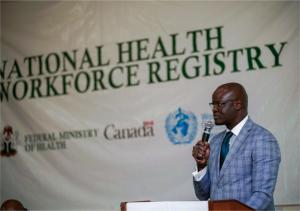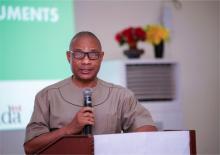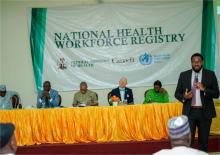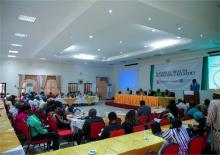Guidance documents of the National Health Workforce Registry validated
Abuja, 29 November, 2019 - To sustain the functionality of the National Health Workforce Registry, Nigerian health policy makers and planners on 27 November 2019 validated the National Health Workforce Registry.
The registry, which consists of Standard Operation Procedures (SOP) and the implementation guides serves as a database for accurate and timely evidence-based health workforce information and it links health workers to administrative units and health facilities. It also demonstrates Nigeria’s significant progress in achieving the Global Strategy for Human Resources for Health: Workforce 2030 milestone
Establishment of a functional registry further sets the foundation for achieving the goal of the Strategic Pillar 3 and Priority Area 9 of the Second National Strategic Health Development Plan 2018 – 2022 of having in place the right number, skill mix of competent, motivated, productive and equitably distributed health workforce for optimal and quality health care service provision.
In line with WHO’s 2030 vision on HRH, attainment of Universal Health Coverage (UHC) in Nigeria is largely dependent on adequate and equitable supply of the needed health workforce to improve access of Nigerians to integrated people-centred quality health care services.
During the event to officially validate the guidance documents, Dr Emmanuel Meribole, Director, Health Planning, Research and Statistics in the Federal Ministry of Health said, “The Federal Ministry of Health, under the leadership of the Department of Health Planning, Research and Statistics has worked assiduously toward establishing a central health workforce database known as the National Health Workforce Registry, which is a single and authoritative electronic and web-enabled source of health workforce information that can provide accurate count of all health care personnel that have either worked or currently working at all tiers of government, private sector and diaspora.”
He additionally stated, “In order to have a complete and functional NHWR in Nigeria, data from all the thirty-six States and FCT, Federal Institutions and the Private Sector have to be collected using the Minimum Standard Data Sets, entered, cleaned, standardised and uploaded into the NHWR platform. This can be achieved by sensitising all the key stakeholders, training the data collectors and data entry clerks to enter the data correctly, after which the data will be cleaned, standardised and validated before being uploaded to the platform. The World Health Organisation (WHO) and other Partners are supporting some States towards the establishment of their State Health Workforce Registry which will feed into the National Health Workforce Registry.”
The Officer in Charge (OiC) of WHO Nigeria, Dr Peter Clement in his remarks stated, “The journey of having a comprehensive and functional registry is very timely considering the need to plan for the health workforce in the country in view of the health indices in the recently released Nigeria Demographic and Health Survey 2018”,
The OiC who was represented by Dr Moses Ongom, the Health Systems Advisor, further stated,
“We can only improve the health indices by ensuring that the health workforce is accessible, qualified, well-trained, motivated, skilled and equitably distributed. To achieve this, we need strategic health workforce information. Let me reiterate WHO’s commitment for continued partnership with the FMOH, donors and partners in scaling-up and sustaining the functionality of the National Health Workforce Registry.”
In addition to the SOP and implementation guide of the National Health Workforce Registry, WHO also supported FMoH to develop a basic user training manual, an advanced user training manual and a disaster recovery plan. These documents will be useful in sustaining the functionality of the registry.






